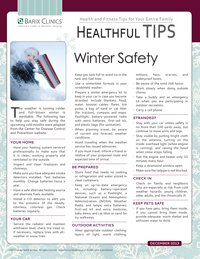Healthful Tips for Winter Safety
The weather is turning colder and full-blown winter is inevitable. The following tips to help you stay safe during the upcoming cold months were adapted from the Center for Disease Control and Prevention website.
Your Home
- Have your heating system serviced professionally to make sure that it is clean, working properly and ventilated to the outside
- Inspect and clean fireplaces and chimneys.
- Make sure you have adequate smoke detectors installed. Test batteries monthly. Change batteries twice a year.
- Have a safe alternate heating source and alternate fuels available.
- Install a CO detector to alert you to the presence of the deadly, odorless, colorless gas. Check batteries regularly.
Your Car
- Install a CO detector to alert you to the presence of the deadly, odorless, colorless gas. Check batteries regularly.
- Keep gas tank full to avoid ice in the tank and fuel lines.
- Use a wintertime formula in your windshield washer
- Prepare a winter emergency kit to keep in your car in case you become stranded. Include blankets, food, water, booster cables, flares, tire pump, a bag of sand or cat litter (for traction), compass and maps, flashlight, battery-powered radio with extra batteries, first-aid kit, and plastic bags (for sanitation).
- When planning travel, be aware of current and forecast weather conditions.
- Avoid traveling when the weather service has issued advisories.
- If you must travel, inform a friend or relative of your proposed route and expected time of arrival.
Be Prepared
- Stock food that needs no cooking or refrigeration and water stored in clean containers.
- Keep an up-to-date emergency kit, including: battery-operated devices, such as a flashlight, a National Oceanic and Atmospheric Administration (NOAA) Weather Radio, and lamps; extra batteries;
first-aid kit and extra medicine; baby items; and cat litter or sand for icy walkways.
Outdoor Activites
- Wear appropriate outdoor clothing: layers of light, warm clothing; mittens, hats, scarves, and
waterproof boots. - Be aware of the wind chill factor.
- Work slowly when doing outside chores.
- Take a buddy and an emergency kit when you are participating in outdoor recreation.
- Carry a cell phone.
Stranded?
- Stay with your car unless safety is no more than 100 yards away, but continue to move arms and legs.
- Stay visible by putting bright cloth on the antenna, turning on the inside overhead light (when engine is running), and raising the hood when snow stops falling.
- Run the engine and heater only 10 minutes every hour.
- Keep a downwind window open.
- Make sure the tailpipe is not blocked.
Check In
- Check on family and neighbors who are especially at risk from cold weather hazards: young children, older adults, and the chronically ill.
Keep Pets Safe
- If you have pets, bring them inside. If you cannot bring them inside, provide adequate, warm shelter and unfrozen water to drink


